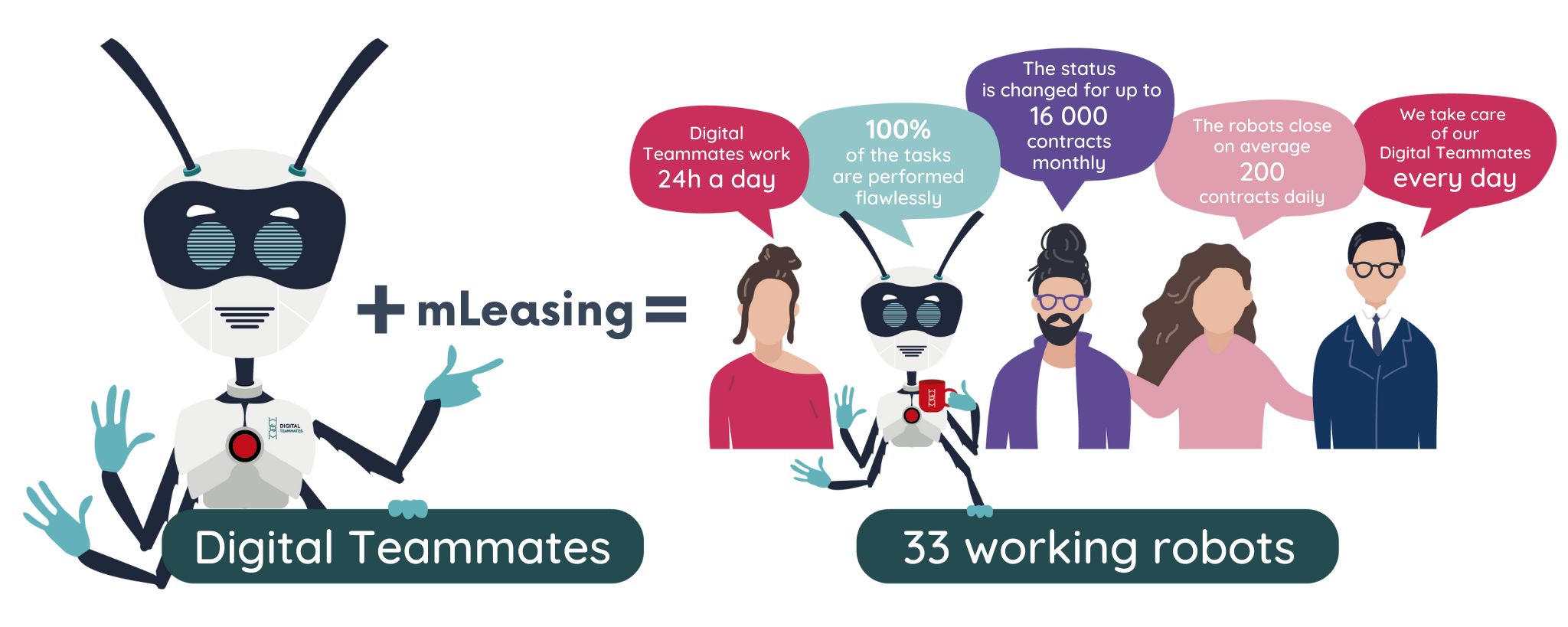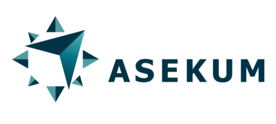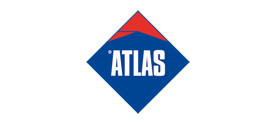Case Study mLeasing

mLeasing is one of the leaders in the leasing industry in Poland. So far, they have financed over 500,000 items with a total value exceeding PLN 60 billion. They support the leasing of vehicles up to 3.5 tons, heavy transport, machinery, and equipment. They also provide financing for commercial and office facilities, hotels, and warehouses. Together with insurance companies for leasing objects, they are constantly expanding their offer on the e-commerce market.
The upcoming increase in the volume of work
Such a wide range of services is also reflected in the scale and diversity of operations. It should be remembered that there is a person behind each of the performed activities, who often must deal with schematic, repetitive and routine activities. Moreover, these processes carry a substantial risk of making an error – in the event of a minor mistake, such as entering one wrong digit, the possible consequences may turn out to be disproportionately high.
The amount of work in mLeasing was growing day by day, and they expected to see an increase in the volume shortly. It was due to the cyclical expiration of lease agreements. The team faced the challenge of finding a solution that would allow them to deal with repetitive and incremental work without the need to increase employment.
When the possibilities were exhausted…
mLeasing started with lean activities, optimized and eliminated places where processes were ineffective. As a result, the business aspects of the process flow improved. The only areas that remained and needed attention were improvements related to technical aspects. Daily, employees of the operational department still use one of the first IT systems prepared for the leasing industry, provided by an external supplier, which complicated the introduction of changes and updates. The possibility of its reconstruction using internal IT resources was limited – due to the high workload of the IT team and the low priority of the back-office department’s needs, which significantly extended the waiting time for improving the technical aspects.
… they decided to implement robots
The staff could not wait that long. The company had to decide how to deal with the impending volume growth. Considering the exhausted other methods of improvement and the heavy burden on internal IT, the decision was made – “we are implementing robots.”
We started our cooperation with mLeasing with the process of timely termination of contracts, which consists in issuing an invoice for the purchase of the leased subject after the end of the lease contract. In the Department of Completion of Contracts, the robots support employees in:
- closing contracts and issuing invoices for the sale of vehicles;
- updating vehicle pricing data in the system;
- registering vehicles in the sales system;
- sending corrections of VAT invoices;
- monitoring the sending of emails to customers;
thanks to which employees can contact the client and resolve more demanding cases. Moreover, they do not have to stay at work after hours, and their work has become more creative and inspiring.
How did people react?
We have always been convinced that robotization will work. Digital Teammates, thanks to their 100% effectiveness and accuracy, gained our trust in the first week of cooperation. The appearance of the first robot was a chance for us, which inspired us to change while relieving us from the most tedious duties.
– Employees of the Contract Termination Department at mLeasing
Honest and open communication was key to the success of the project. Employees knew from the very beginning that the company was not planning to restructure its employment and was preparing for the upcoming increases in labour volumes. Committed employees delegated their processes to the robots and became project leaders. Because of that, there was a sense of hope and anticipation of introducing Digital Teammates. The robots allowed the company to:
- increase work efficiency by solving the problem of growing volume without the need to increase employment;
- expand competencies of their employees.
Employees have become convinced that robotization supports them, and cooperation with Digital Teammates enabled them to build effective and creative workplaces. Currently, 33 robots work in 4 teams at mLeasing, and three are in the testing or development phase. We are not slowing down by identifying subsequent processes with robotic potential that we hand over to robots.
Next steps of cooperation…
Employees, seeing the effects of implementing the first robots, decided to find the next repetitive tasks. This is how the project of scaling up robotization has started. We have decided to run this project using an agile framework. Each mLeasing department has chosen the Leaders. They are responsible for the implementation of robots to their Teams and the contact with RoboShepherds. Moreover, the IT department of mLeasing has dedicated one employee responsible to support the project and provide necessary access rights.
We conduct robotization scaling activities among the teams responsible for:
- Settlements;
- Contract handling;
- Sales and Settlement Records.
The search made it possible to implement robots that:
- generate reports of settlements with clients;
- change payment terms;
- monitor unconfirmed adjustments;
- close contracts;
- create statements in MS Excel;
- deal with foreign policies;
- verify the insurance instalments.
mLeasing, as well as many companies attempting to scale robotization, was aware of the new upcoming challenges. At this stage of business process automation, the emphasis is on agile. Agile development allows for regular delivery of smaller fragments of the final solution and high flexibility of implementation. Each of mLeasing teams independently contacts the Robot Shepherds, the very business structure of the organization is dispersed, and the approach to implementing robots is carried out using the iterative method. These teams are responsible for presenting the business sequence of the process. They also supervise the entire course of robotization from mLeasing perspective. When it is necessary to involve an IT employee, Robot Shepherds contact him with the task number that was assigned in the mLeasing reporting system.
The following list presents the goals we have achieved together, thanks to which the scaling of robotization in the organization has been effective:
• mLeasing employees delegated their tasks to Digital Teammates, thus gaining assistants. We, on the other hand, released the employee potential by handing over the tedious and repetitive activities to robots.
• Each team works based on agile methods – in subsequent sprints, new robots are created, or the existing ones are modified.
• Strict communication paths were established with implementation stakeholders outside of robotic teams.
• Robots undergo a process of automatic testing, thanks to which it is possible to gain knowledge about changes before they are even introduced into production systems.
Effective scaling of robotization in the organization
The process of implementing and producing a robot is similar for each of the tasks. Here, an essential element is the so-called robotic potential analysis. The process indicated for automation by mLeasing employees is carefully checked by Shepherds. Based on such an analysis, we decide the rightness of handing over the process to robots. It should be remembered that processes with a small number of instances, not sufficiently involving employees, and too small are not subject to robotization. When choosing processes for robotization, it is crucial for us that mLeasing employees entrust to robots the processes related to data preparation and processing. It allows to regain time for direct contact with the client and building a relationship with him.
On the other hand, not only the already operating processes developed by mLeasing employees were automated. One of the challenges we faced together was a major business change dictated by legal modifications. mLeasing leaders prepared the course of the task, and we confirmed the feasibility of its robotization. Then it was decided that the process would be handled by robots. Instructions were prepared to follow the new legal rules and the process was handed over to Digital Teammates from the very beginning.
On average, every 3 months we update the robots working in mLeasing. Most often these are changes due to technical changes. An important aspect is also the management and monitoring of robots. There are 2 methods of verifying the robot’s work. The first is the so-called technical dashboard that is monitored by Robot Shepherds and Customers – it shows the progress and work performed. The second is the observation of the effects of the robot’s work – summaries, reports, and e-mails. At any time, you can check which tasks have been performed by the robot and which it is currently performing.
We have achieved new successes!
Thanks to this approach and excellent communication between mLeasing and Digital Teammates, we maintain the continuity of the processes. Currently, 33 robots are working in 4 Teams in mLeasing. And we are not slowing down, and we are still identifying new processes with robotic potential, which we will hand over to our Digital Teammates.







